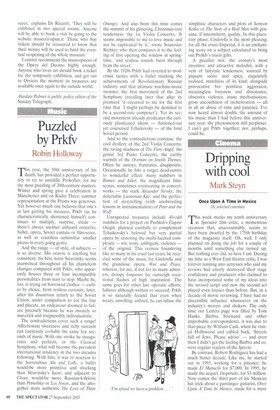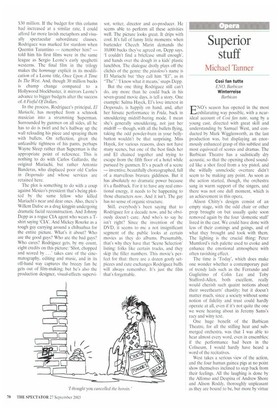Dripping with cool
Mark Steyn
Once Upon A Time in Mexico 18, selected cinemas
Tweek marks my tenth anniversary 1 as Spectator film critic, a momentous occasion that, unaccountably, seems to have been dwarfed by the 175th birthday of the magazine itself. Oh, well. I only planned on doing the job for a couple of months until something else turned up. But nothing ever did, so here I am. During my time as a West End theatre critic, I was forever running into actresses who said my reviews had utterly destroyed their stage confidence and producers who claimed to have incorporated some of my ideas into the revised script and now the second act played even lousier than before. But, in a decade of movie reviewing, I have had no discernible influence whatsoever on the industry's movers and shakers. The only time our Letters page was filled by Tom Hanks, Barbra Streisand and other improbable correspondents, it was due to that piece by William Cash, when he visited Hollywood and cabled back, `Streets full of Jews. Please advise' — and even then I didn't get the feeling Barbra and co. were regular readers of the Speccie.
By contrast, Robert Rodriguez has had a much better decade. Like me, he started out in 1993, working for a pittance: he made El Matiachi for $7,000. In 1995, he made the sequel, Desperado, for $3 million. Now comes the third part of his Mexican hat trick about a gunslinger guitarist, Once Upon A Time In Mexico, made for a mere
S30 million. If the budget for this column had increased at a similar rate, I could afford far more lavish metaphors and visually spectacular subordinate clauses. Rodriguez was marked for stardom when Quentin Tarantino — remember him? — told him his first films were in the same league as Sergio Leone's early spaghetti westerns. The final film in the trilogy makes the hommage explicit in its modification of a Leone title, Once Upon A Time In The West. And, though 30 million bucks is chump change compared to a Hollywood blockbuster, it mirrors Leone's advance to bigger budgets after the success of A Fistful Of Dollars.
In the process. Rodriguez's principal, El Mariachi, has morphed from a schnook musician into a strumming Superman. Surrounded by gunmen on all sides, all he has to do is twirl and he's halfway up the wall reloading his piece and spraying them with bullets. On reflection, given the unfeasible tightness of his pants, perhaps Wayne Sleep rather than Superman is the appropriate point of reference. This is nothing to do with Carlos Gallardo, the original Mariachi, but rather Antonio Banderas, who displaced poor old Carlos in Desperado and whose services are retained here.
The plot is something to do with a coup against Mexico's president that's being plotted by the same fellow who killed Mariachi's near and dear ones. Also, there's Willem Dafoe as a drug kingpin undergoing dramatic facial reconstruction. And Johnny Depp as a rogue CIA agent who wears a Tshirt saying 'CIA'. And Mickey Rourke as a tough guy carrying around a chihuahua for the entire picture. What's it about? Who are the good guys? Who are the had guys? Who cares? Rodriguez gets, by my count, eight credits on this picture: 'Shot, chopped and scored by . . .' takes care of the cinematography, editing and music, and in its off-hand way captures the breezy fun he gets out of film-making; but he's also the production designer, visual-effects supervi
sor, writer, director and co-producer. He seems able to perform all these activities well. The picture looks great. It drips with cool. It's full of funny little moments: when bartender Cheech Mann demands the 10,000 bucks they've agreed on, Depp says. 'I couldn't find a briefcase small enough', and hands over the dough in a kids' plastic lunchbox. The dialogue drolly plays off the clichés of the genre: the pistolero's name is El Mariachi but 'they call him "El", as in "The".' I know what it means,' snaps Depp.
But the one thing Rodriguez still can't do, any more than he could back in his seven-grand movie days, is tell a story. One example: Salma Hayek, El's love interest in Desperado, is happily on hand, and, after her hirsute performance in Frida, back in smouldering midriff-haring mode. I mean she's generally smouldering, not just her midriff— though, with all the bullets flying, taking the odd powder-burn in your bellybutton wouldn't be that surprising. Miss Hayek, for various reasons, does not have many scenes, but one of the best finds her and El chained together and trying to escape from the fifth floor of a hotel while pursued by gunmen. It's a peach of a scene — inventive, beautifully choreographed, full of a marvellous bravura giddiness. But it has absolutely no dramatic power because it's a flashback. For it to have any real emotional energy, it needs to be happening to those characters now. And it isn't. The guy has no sense of organic structure.
Still, everybody's been saying that to Rodriguez for a decade now, and he obviously doesn't care. And who's to say he isn't right? Since the invention of the DVD, it seems to me a not insignificant segment of the public looks at certain movies as they do albums. Presumably, that's why they have that 'Scene Selection' listing: folks like certain tracks, and they skip the filler numbers. This movie's perfect for that: there are a dozen goofy setpieces and cute exchanges Rodriguez buffs will always remember. It's just the film that's forgettable.



























































































 Previous page
Previous page